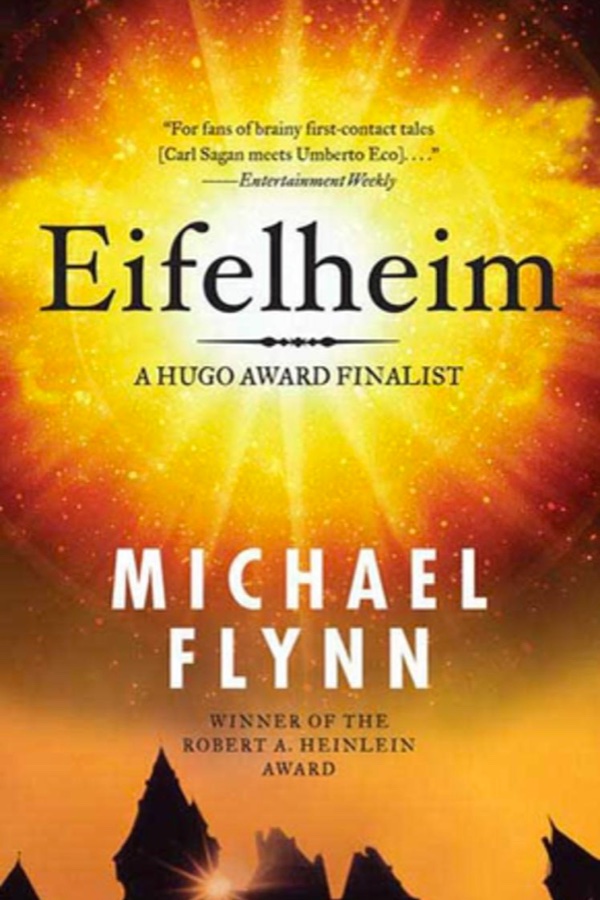In 1348, the world was changing, and death haunted the Black Forest. Eifelheim, by Michael Flynn, is an engrossing, genre-crossing science fiction novel with a philosophical bent. Working equally as historical fiction and hard (that is, technical) sci-fi, the Hugo-nominated book stands apart from other first contact novels because of its author’s quirky approach, and his broad learning. Besides aliens, scholastic philosophy, Catholic theology, and experimental physics are also on the menu, and the result is a surprisingly cerebral book. But Eifelheim has a heart as well, and presents an interesting look into the personalities, thoughts, and interlocking stories of the residents of one doomed town in its last days.
In the present day, mathematical historian Tom Schwoerin can’t understand why a small German town, wiped out by the plague, was never resettled. Cosmologist Sharon Nagy, Tom’s longtime domestic partner, has troubles of her own, and little time for the problems in a soft science like cliology*. But as Tom digs deeper into the mystery of Eifelheim, and as Sharon learns that her own ideas may not be so welcome in academia, fault lines also begin to show in their long-standing relationship.
Meanwhile, in 1348, Father Dietrich has troubles of his own. A man of learning, the doctor seclusus now resides far from the centers of European learning, far from Jean Buridan, and from his old friend Will (William of Ockham, who makes a wonderful cameo.) He now attends to the sanctification of his small but variegated flock. There is the devout Theresia, whom he took under his wing, and the miller’s wayward wife, Hildegarde, a cause of scandal in the village. There is the widowed Herr Manfred, Lord of the High Woods, a practical man of war, and the Spiritual Franciscan Brother Joachim, a man at turns frustratingly irrational and surprisingly intuitive. Indeed, this is a novel with so many characters, a detailed list was included in the front of the book.
As the book opens, Pastor Dietrich has just finished hearing a confession, and has diagnosed what he takes to be the penitent’s root vice. Soon afterward, something lights up the sky and crashes into the Black Forest, leaving a path of destruction, and an odd and unfamiliar essence in the air. Odd, but not supernatural, the philosophical priest quickly concludes. A man of great learning, and also deeply devout, Dietrich is ideally situated to encounter whatever or whomever has arrived. But what could have happened in the past to bring an intellectual of his caliber to reside in such an out of the way place?
Eifelheim is a fascinating look at the clash of ideas: modern with medieval, theist with materialist, hard science with soft, human with extra-terrestrial, speculative with practical, created with Divine. Dealing with the information dump is one of the sci-fi’s occupational hazards, and the danger is especially great in a novel that requires readers to follow and be immersed in both medieval history and modern scientific cosmology. On top of that, Flynn seems at pains to correct misconceptions about the medieval world, and to emphasize its attractive and reasonable elements. He pulls all this off by putting characters in dialog, and in debate, and by structuring these interactions as the means toward important plot reveals. Not an easy task! Moreover, the premises is inherently interesting, and his writing and characterization very good, all of which work to keep the reader engaged.
The book is not for everybody. Like most contemporary hard sci-fi, it is aimed at readers who take ideas very seriously, and who have at least a passing interest in the “big questions”. Although there is some action, it is far from an explosion-fest, and most of the drama is character or theme related. A film could be made of it, but it would be the slow-moving, meditative kind. The ending, as the reader knows from the beginning, is on the sad side. Still, Flynn does an excellent job of delivering complicated themes in a gripping way, and of avoiding the soapbox. Although it’s obvious that Flynn favors Pastor Dietrich’s general view of things, the characterization is so even and realistic, that the reader doesn’t feel preached at. No one character in the story has everything right, and Flynn even avoids making the slightly fanatical Brother Joachim into a complete caricature, or merely a foil for Dietrich. In the end, this is a story that glories in the variety of persons, thought systems, and societies, while drawing stark attention to their one common enemy—Death.
One light criticism: Flynn occasionally dumps a little too much information in a dialog, although it’s also hard to imagine how he could avoid this. Also, readers should be aware that the novel contains a few mature elements, including a brief scene of sexuality, discussions about the misbehavior of some townspeople, and rather graphic descriptions of plague wounds located in private regions of the body. On one occasion, a protagonist seems to downplay the guilt of a disordered action, but he is quickly corrected by another character. These elements seemed largely appropriate to their purposes within the novel, and do not detract from the novel’s excellent quality.
All things considered, Eifelheim is a very fine science fiction novel, and should be on the reading list of everyone interested in the interaction of medieval and modern philosophy, science, and even politics. Flynn’s novels—The January Dancer, Up Jim River, The Wreck of the River of Stars, and several others—have earned him a reputation as a contemplative science fiction writer. A beauty and a sadness runs through some of his work that draws one’s attention to the impermanence of created things, and which seems to point toward a higher reality. For readers of the appropriate age, I highly recommend Eifelheim.
*cliology, as far as I can tell, is an apocryphal science



